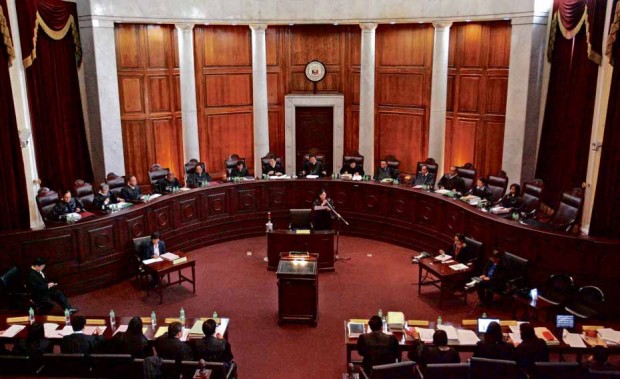
IT’S A GOFOR GRACE. The Supreme Court rules Sen. Grace Poe can run for President, junking decisions of the Commission on Elections
disqualifying Poe based on her citizenship and residency. LYN RILLON/INQUIRER FILE PHOTO
The Supreme Court justices who declared Senator Grace Poe eligible to run for a national elective post have in effect amended the 1935 Constitution which is an act beyond the powers of the high court, Associate Justice Teresita Leonardo de Castro said.
In her 47-page dissenting opinion, De Castro said the 1935 Constitution which was governing when Poe was found in 1968 at a church in Jaro, Iloilo did not mention foundlings as among those considered citizens of the country.
By declaring Poe a natural-born Filipino citizen, De Castro said the high court justices in effect have added another category in the enumeration under Section 1, Article IV of the 1935 Constitution.
READ: SC: Poe a natural-born Filipino citizen, PH resident for 10 years
“This amendment of the Constitution by the judicial opinion put forth by the seven justices is based mainly on extralegal grounds and a misreading of existing laws, which will have unimaginable grave and far-reaching dire consequences in our constitutional and legal system and national interest,” De Castro said.
Like Associate Justice Mariano Del Castillo, De Castro said the high court’s ruling could open the floodgates to non-Filipinos misusing the decision on foundlings to be able to run for public office.
De Castro said it is “to the detriment of national interest and security.”
READ: SC voting in Poe’s case questioned
“Our country must not only be defended and protected against outside invasion, it must also be secured and safeguarded from any internal threat against its sovereignty and security,” Del Castillo, on the other hand, said.
“I do not want to wake up someday and see my beloved country teeming with foreigners and aliens posing as natural born Filipinos while the real natives are thrown into oblivion or relegated second or third class citizens who have become strangers in their own homeland,” he lamented.
Associate Justice Arturo Brion, in his 144-page dissenting opinion, said the majority ruling ignored the well-established jurisprudence giving the Commission on Elections (Comelec) power to determine eligibility of candidates in elections.
Brion believes the Poe ruling was a complete turnaround from previous rulings of the high tribunal upholding Comelec’s jurisdiction to determine eligibility as part of determining false material representation in a candidate’s certificate of candidacy (COC).
He cited cases involving the ouster of Rommel Arnado as mayor of Kauswagan, Lanao del Norte for continued use of United States passport despite having renounced his American citizenship and Regina Ongsiako-Reyes as Marinduque lawmaker for being an American citizen.
“With the Comelec stripped of the jurisdiction to determine, even preliminarily, Poe’s citizenship and residence, then its determinations are null and void, leading to the further conclusion that this Court no longer has any issue left to review and to decide upon as neither would it be necessary to determine Poe’s eligibilities,” Brion stressed.
The high court’s majority ruling agreed with the position taken by the tribune of the people—the Office of the Solicitor General which cited statistical probability that any child born in the country would be a natural-born Filipino is either 99.93 percent or 99.83 percent, respectively, during the period 2010 to 2014 and 1965 to 1975 based on records of Philippine Statistic Authority.
However, Associate Justice Estela Perlas-Bernabe said the circumstances surrounding Poe’s abandonment, as well as her physical characteristics, “hardly assuage this possibility.”
“By parity of reasoning, they do not prove that she was born to a Filipino: her abandonment in the Philippines is just a restatement of her foundling status, while her physical features only tend to prove that her parents likely had Filipino features and yet it remains uncertain if their citizenship was Filipino,” Bernabe said.
De Castro, Del Castillo, Brion and Bernabe were among the six justices who dissented from the majority ruling allowing Poe to proceed with her presidential bid after a finding that the Comelec committed grave abuse of discretion in canceling her COC over material misrepresentation in her citizenship and residency eligibilities.
The other two were Senior Associate Justice Antonio Carpio and Associate Justice Bienvenido Reyes. RAM
RELATED VIDEOS